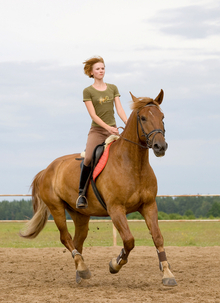Fiber is an essential part of every horse’s diet. Feeding a minimum of 1% bodyweight in forage per day (dry matter basis) is recommended to supply adequate levels of fiber required for proper gut function.

Providing forage benefits for horses
Feeding hay stretchers or complete feeds can be a cost-effective alternative to feeding expensive or poor-quality hay, since the concentrate portion of the diet can be reduced and there is little to no feed waste compared to hay.
Horses grazing good quality pasture and/or provided ample access to hay generally have no problem meeting this minimum requirement. However, there are times when good hay is hard to find due to severe drought, winter months, or other weather patterns.
During a hay shortage, hay quality tends to decline along with the supply. If affordable good quality hay cannot be found locally, it may be possible to source it from outside the region. Another option is to utilize forage alternatives, which are high fiber feeds that can safely be used as a substitute for the forage component of a horse’s diet. These feeds can be used to either stretch the available hay supply or completely replace it if necessary.
Several Purina® feed products contain the appropriate types and amount of fiber to effectively serve as forage alternatives. Most of these feed products can easily be found at Purina® feed dealers across the United States and are available year round.
Feeding hay stretchers or complete feeds can be a very cost-effective alternative to feeding expensive or poor-quality hay, especially considering the fact that the concentrate portion of the diet can be reduced or eliminated and there is little to no feed waste compared to hay.
In addition to Purina® feed products, there are unfortified forage alternatives available that can be used either as a partial or a complete replacement for hay:
- Purina® Horseman’s Edge® Hay Stretcher 12% protein, for all horses, slightly larger pellet size. Provides good nutrition at a good value.
- Purina® Horse Chow #100® Horse Chow feed – 10% protein, for mature horses, #200® Horse Chow feed – 14% protein, for growing, breeding and performance horses.
- Equine Adult® – 12% protein, for mature active pleasure horses.
- Equine Junior® – 14% protein, for weanlings through 2 years of age.
- Equine Senior® – 14% protein, for aging horses and/or horses with dental issues.
These Equine family products are premium, pelleted products with excellent quality fiber sources and high quality nutritional balance.
- Purina® Horseman’s Edge® Senior 14% protein, for aging horses and/or horses with dental issues. Provides good nutrition at a good value.
- Purina® Omolene #400® 12% protein, for performance horses or hard keepers. Includes loose beet pulp, contains no oats or alfalfa for horses with allergies. Higher calorie and highly palatable premium product with excellent quality fiber sources and high quality nutritional balance.
Feeding guidelines:
- As a partial replacement – replace 50% of the hay with the Purina® feed and reduce concentrate by approximately ½ lb to 1½ lbs/day
- As a full replacement – replace 100% of the hay and reduce the concentrate by approximately 2-3 lbs/day
- As a complete feed – follow product feeding directions
To avoid digestive upset, any dietary change should be made very gradually, taking at least 7 to 10 days for a full transition. When using pelleted hay, hay stretchers or complete feeds, it is best to divide the daily ration into three or more meals per day. If the horse has no dental problems, feeding some long-stemmed hay is recommended as it provides some beneficial “chew factor.” A hay shortage can be a challenging time, but taking advantage of the many options available to replace or stretch the current hay supply will help to get horses through until the next hay season.
By Kelly R. Vineyard, MS, PhD Research Equine Nutritionist, Purina Animal Nutrition
